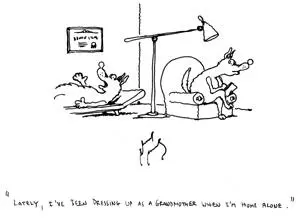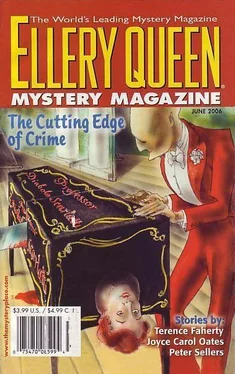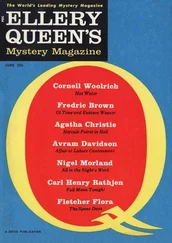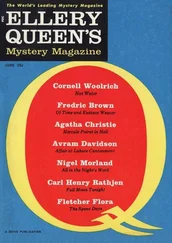Albert Baantjer - Ellery Queen’s Mystery Magazine. Vol. 127, No. 6. Whole No. 778, June 2006
Здесь есть возможность читать онлайн «Albert Baantjer - Ellery Queen’s Mystery Magazine. Vol. 127, No. 6. Whole No. 778, June 2006» весь текст электронной книги совершенно бесплатно (целиком полную версию без сокращений). В некоторых случаях можно слушать аудио, скачать через торрент в формате fb2 и присутствует краткое содержание. Город: New York, Год выпуска: 2006, ISBN: 2006, Издательство: Dell Magazines, Жанр: Детектив, на английском языке. Описание произведения, (предисловие) а так же отзывы посетителей доступны на портале библиотеки ЛибКат.
- Название:Ellery Queen’s Mystery Magazine. Vol. 127, No. 6. Whole No. 778, June 2006
- Автор:
- Издательство:Dell Magazines
- Жанр:
- Год:2006
- Город:New York
- ISBN:ISSN 0013-6328
- Рейтинг книги:4 / 5. Голосов: 1
-
Избранное:Добавить в избранное
- Отзывы:
-
Ваша оценка:
- 80
- 1
- 2
- 3
- 4
- 5
Ellery Queen’s Mystery Magazine. Vol. 127, No. 6. Whole No. 778, June 2006: краткое содержание, описание и аннотация
Предлагаем к чтению аннотацию, описание, краткое содержание или предисловие (зависит от того, что написал сам автор книги «Ellery Queen’s Mystery Magazine. Vol. 127, No. 6. Whole No. 778, June 2006»). Если вы не нашли необходимую информацию о книге — напишите в комментариях, мы постараемся отыскать её.
Ellery Queen’s Mystery Magazine. Vol. 127, No. 6. Whole No. 778, June 2006 — читать онлайн бесплатно полную книгу (весь текст) целиком
Ниже представлен текст книги, разбитый по страницам. Система сохранения места последней прочитанной страницы, позволяет с удобством читать онлайн бесплатно книгу «Ellery Queen’s Mystery Magazine. Vol. 127, No. 6. Whole No. 778, June 2006», без необходимости каждый раз заново искать на чём Вы остановились. Поставьте закладку, и сможете в любой момент перейти на страницу, на которой закончили чтение.
Интервал:
Закладка:
I gave him the money. “What the hell is that?”
“A fan letter.”
“You know who did it?”
He nodded as he counted.
“Who?” He didn’t answer, so I tried, “When?”
“This morning.” He started to shut the scarred door.
“It must have taken a long time.”
“It took one hour and nine minutes,” he said.
“This is Tom’s last night,” Kevin told me the next evening.
I was shocked. Tom had just started his second set. He seemed the same as every other night. There were ways in which he was a pain in the ass. But the people came to see him and they spent money. I wondered what had happened to get him fired so abruptly.
“Can’t you let him finish the week?” I asked.
“It’s not my idea,” Kevin said. “He was gonna just take off, but he wanted to warn me. He said not to tell anybody. Keep it under your hat.”
I was out back when Debbie pulled up. She bathed me in her headlights again, but this time shut them off right away. “Is Tom inside?” she asked.
“Not for long,” I said. Kevin’s news had me shaky and sad.
“What do you mean?”
“He’s leaving.” I hadn’t meant to say it aloud. I’m still not convinced that I did. It certainly wasn’t spoken any louder than a whisper, the kind you say to yourself when you’re not quite able to comprehend what you think you’ve just heard.
Debbie stared at me, head tipped to one side. “Leaving,” she said, in that same kind of whisper.
After his third set, I said to Tom, “Have you had a chance to look at my manuscript?”
He snapped his fingers, something he did with authority. “Damn, I’ve been meaning to give that to you.” He opened his guitar case and took out a sheaf of papers held together with an elastic band. “I kinda spilled coffee on it. Sorry. And there’s a little jam about page one seventy, one eighty. It has potential.” He handed it to me. “There’s notes here and there. Let’s discuss it after the show.” He started for the back door.
I took the manuscript to the best-lighted table. His notes were surprisingly thorough. Some were effusive in their praise. Others pointed out redundancies, ugly metaphors, and places where I used too many words. His comments on plot weaknesses and clichéd scenes were lucid and clear. Nothing he said was without support and, although I didn’t agree with all his remarks, I knew that if I followed his guidelines the work would be better. I was so engrossed that I didn’t notice that he was late for the fourth set.
He always started on the dot of twelve. At twelve ten, I went outside to look for him. Debbie’s Parisienne was still there, now backed into its spot against the fence. She was leaning against the car, smoking, and breathing heavily. The cigarettes were taking their toll. Good, I thought.
“Have you seen Tom?” I asked.
“Why?”
“I wanted to thank him.”
“I’ll tell him,” she said, “when I see him again.”
Back inside, Tom’s guitar was still on the stage. I knew he wouldn’t have left it behind. I went out back again. He still wasn’t there, and Debbie’s car was gone.
Maybe Tom had decided to quit singing for good. That didn’t seem like him, though. I took the guitar home, sure that one day he’d return and want it back. I’ve kept it ever since. It’s the least I can do.

The Theft of the Blue-Ribbon Pie
by Edward D. Hoch
Copyright © 2006 Edward D. Hoch
Nick Velvet, the most popular of Ed Hoch’s series characters, has been under almost continuous option for television over the past decade. With any luck, 2006 will finally see him make his American TV debut. French TV ran a short series starring the thief of valueless things back in the ’70s. How much longer must U.S. fans wait? For statistics on other Hoch characters, see this month’s Jury Box.
When Nick Velvet told Gloria he’d never at-tended a county fair, she couldn’t believe it. “Never? In your whole life? That’s like saying you’ve never been to a circus or ridden on a train. Everyone’s been to a county fair.”
They were driving across northern New Jersey, bound for the fair in Jackson County, just over the Pennsylvania line. It was a hot August afternoon with only a few wispy clouds drifting across the blue of the sky. “I don’t think they have county fairs in Manhattan,” he told her. “At least I never heard of any. I grew up in Greenwich Village, remember.”
“Still—” She twisted in her seat to face him as he drove. “Didn’t you have an aunt or uncle that you visited on a farm every summer? I sure did!”
“They sent me off to a boys’ camp one summer and I hated it. I wouldn’t go back the following year. I guess I was always a city boy.”
“So here we are, heading for the Jackson County Fair. What happened?”
“Milo Marx is paying me to steal an apple pie — whichever one wins the blue ribbon at the fair tomorrow morning.”
Marx was a well-known artist and collector of pop-culture artifacts who could have purchased ten thousand pies for what he was paying for this one, but Nick had stopped questioning the motives of his clients. Just one visit to Milo Marx’s home — really a museum in the making — convinced him that a blue-ribbon pie from the Jackson County Fair was the only thing that would satisfy him. “The entire place was filled with objects,” he’d told Gloria. “Books, sewing baskets, starfish, ironing boards, you name it. He finds a perfect shape or design in everyday items, or even in nature, and he collects them. He sprays the things with a plastic coating to preserve them, or entomb them, if you’d prefer. He’s heard that the apple pies at the Jackson County Fair are real works of art, and he must have one for his collection. He tried to buy last year’s winner and they refused to sell it to him. They said the pies only went to local people.”
Nick had pointed out to Marx that he could hire a couple of kids to run in and steal the pie for a hundred bucks, far less than his fee, but the collector insisted, “It’s not as easy as it seems, with a building full of people watching. Kids might drop or damage it somehow. The pie must be intact to preserve the beauty of its design.”
Nick and Gloria had left early Wednesday morning, taking Route 78 across Jersey to Middletown, Pennsylvania, then turning north to Jackson County. It was a rural area at the edge of the Poconos, and they passed a few dairy farms along with the usual fields of corn and various crops Nick couldn’t identify. The fair was at Clydestown, the county seat, a place of neat frame houses with a few brick buildings and churches clustered around a little park at its center. “Isn’t this lovely, Nicky?” Gloria said. “I didn’t know places like this still existed.”
He slowed down a bit, spotting a sign with an arrow pointing toward Jackson County Fair, August 6-13. “This is it.”
“We missed the first half of it.”
“And we’ll miss the end of it, too.” Nick told her. “I’ll pick up the winning pie in the morning and we’ll be out of here.”
“You sound as if you’ll just walk in there and they’ll hand it to you.”
“Something like that.”
They left the car in a massive field that had been turned into a parking lot for the week’s festivities. The cars and SUVs were almost outnumbered by pickup trucks, and there were even a few horse trailers for transporting livestock. “This is real country,” Nick decided, wading through the oil-stained grass and weeds already trampled half to death. They’d barely entered the Show Pavilion when they were greeted by a stout woman wearing a straw hat trimmed with daisies. “Welcome to the fair, folks! You from Scranton?”
Читать дальшеИнтервал:
Закладка:
Похожие книги на «Ellery Queen’s Mystery Magazine. Vol. 127, No. 6. Whole No. 778, June 2006»
Представляем Вашему вниманию похожие книги на «Ellery Queen’s Mystery Magazine. Vol. 127, No. 6. Whole No. 778, June 2006» списком для выбора. Мы отобрали схожую по названию и смыслу литературу в надежде предоставить читателям больше вариантов отыскать новые, интересные, ещё непрочитанные произведения.
Обсуждение, отзывы о книге «Ellery Queen’s Mystery Magazine. Vol. 127, No. 6. Whole No. 778, June 2006» и просто собственные мнения читателей. Оставьте ваши комментарии, напишите, что Вы думаете о произведении, его смысле или главных героях. Укажите что конкретно понравилось, а что нет, и почему Вы так считаете.












